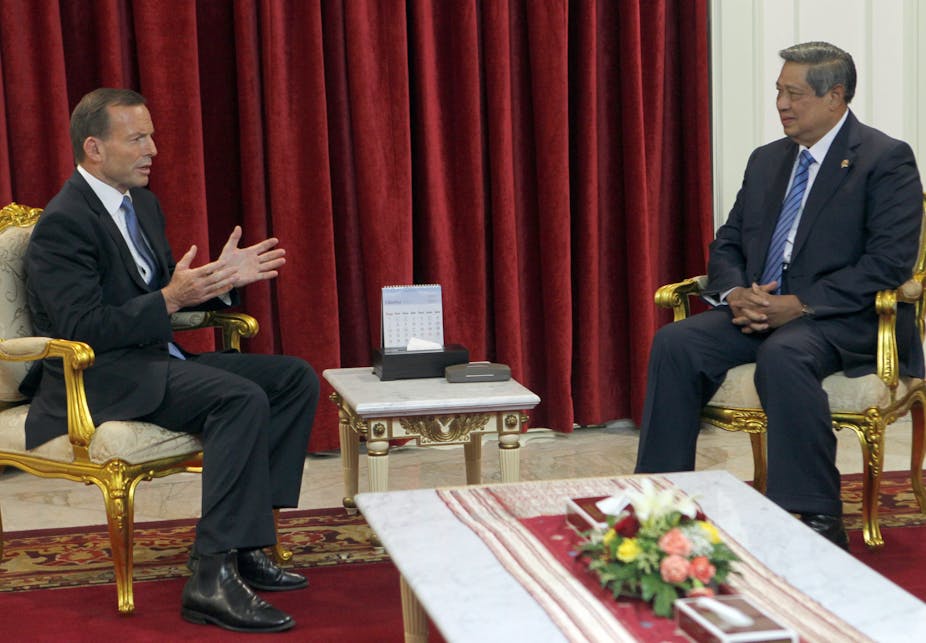In the coming days, prime minister Kevin Rudd will visit Indonesia to discuss asylum seeker policy with Indonesian officials, including Indonesian president Susilo Bambang Yudhoyono. Rudd’s visit will no doubt further a national debate that has recently dominated Australian political discourse.
At this stage, the days-old Rudd government has provided little solution to the issue, but has promised to work collaboratively with the Indonesian government to find one. The Coalition, on the other hand, has been extremely vocal in their presentation of asylum seeker policy.
But according to Rudd, if opposition leader Tony Abbott’s policy was to be implemented, there would be a conflict with Indonesia later this year.
Abbott, of course, said there will be no conflict. Shadow foreign minister Julie Bishop said that in private conversations with senior Indonesian politicians and officials, they have confirmed that Indonesia would “co-operate” with the initiative to turn the boats around.
But Bishop’s claims have been met by public assertions to the contrary from many Indonesian officials, including vice president Boediono, foreign minister Marty Natalegawa and Indonesia’s Ambassador to Australia Nadjib Riphat Kesoema.
While it is a little surprising that Bishop herself feels free to reveal the content of such conversations, it is true that the megaphone has often been the chosen device for Australian diplomatic communication with Indonesia.
If Abbott takes office later this year and implements his policy of turning back the boats, it is clear what Yudhoyono will do. He will follow his trademark political strategy: do nothing. There is no political incentive for him to do anything else, which it can only be assumed that Tony Abbott is well aware of.
This, however, is not the real question.
The real question is what Yudhoyono’s successor as Indonesian president would do. Presidential elections are due to be held in Indonesia in July 2014. If no candidate wins an absolute majority in the first round, then a second round of voting - limited to the top two candidates - will be held in September. And Yudhoyono cannot stand again, having reached the constitutionally-determined limit of two terms.
The campaign for the election has already begun. Advertising for the three currently declared candidates – Aburizal Bakrie, Prabowo Subianto and Wiranto - has been splashed across televisions throughout the country.
Most polls are currently showing Prabowo in the lead, though generally with only about 20% of the survey vote. But there are other candidates expected to come forward in the next few months. These include Joko Widodo, the Jakarta govenor; Jusuf Kalla, Yudhoyono’s first Vice President; Mahfud MD, the Chief Justice of the Constitutional Court; and Megawati Sukarnoputri - though the recent death of her husband may change her plans.
For all of these candidates, the asylum seeker issue is not a major policy concern. It does have some resonance domestically, but mostly in terms of the desire of asylym seekers to flee Indonesia - and the plight they face in doing so. The “not my problem” syndrome is still dominant.
Indeed, the Indonesian relationship with Australia as a whole is not particularly important to Indonesia’s presidential candidates.
What this means is that the response to Abbott’s plans will be opportunistic rather than principled. They will be influenced by how the issue plays out in local and regional politics rather than in terms of any humanitarian concerns. In other words – it will be a response remarkably similar to Australia’s.
Of the declared Indonesian presidential candidates, currently only Prabowo looks like he has a serious chance of winning the top job. Can we say anything about how he might respond to the opposition’s policy? One Indonesian academic said of him recently that:
He will be very cruel to Australia. He will let the boats go. He will give food and petrol and money to ships and tell them to just go, go to Australia.
This is probably – hopefully - an exaggeration. But Prabowo certainly has no affection for Australia, and would not hesitate to frustrate Australian government policy if there was political benefit in doing so. And his track record suggests he would be quite prepared to sacrifice the lives of asylum seekers to make a political point.
But even if it is someone else who ends up as Indonesian president in 2014, there is no guarantee that their position will be any more favourable to Australia. All the arguments that have previously attempted to explain Indonesia’s reluctance to additionally assist Australia in this matter will still be valid.
These arguments may have been strengthened during the election campaign. It currently seems likely that many of the candidates will campaign on platforms of greater political and economic nationalism than was the case in 2009.
In the Indonesian community, there is currently a rising sense of concern at the influence that foreigners and foreign interests are supposedly having on domestic and foreign policy. No new president is likely to go against this trend, and allow Australia to be seen to be dictating policy to Indonesia.
Regardless of who wins the next Indonesian elections, it seems highly unlikely they would accept the return of asylum seekers. Does this mean there will be conflict with Indonesia if Abbott tries to “turn the boats back” later this year, should he win government?
The avoidance of conflict lies largely in Abbott’s court – even moreso given his assertion that his foreign policy would be focused on in Jakarta rather than Geneva.
So if Tony Abbott does take office as prime minister later this year, look out for a creative interpretation of what “co-operate” means.

